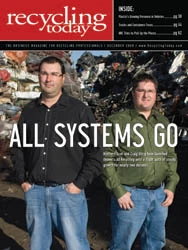The California Air Resources Board wants to clear the air in the Golden State. But its efforts to establish and enforce new air-quality regulations leave many fleet operators confused, especially as the struggling economy makes it difficult to invest in clean-air (green) technology.
Full-service truck leasing can offer fleet operators some answers. Full-service leasing companies, such as PacLease, Bellevue, Wash., provide trucks that not only meet and exceed the state’s new air quality standards, but that also help operators improve their image, driver morale, productivity and fleet efficiency.
And because full-service leasing companies handle all the truck maintenance, their customers are free to concentrate on their businesses and not on equipping and training maintenance shop personnel to keep pace with the latest in vehicle technology.
CLEARING THE AIR
The California Legislature established the California Environmental Protection Agency Air Resources Board, also known as CARB, in 1967. The legislature granted the 11-member, governor-appointed board the authority to regulate various activities in manufacturing, agriculture and transportation that could affect air quality.
Several local and state agencies, particularly those in urban areas with frequent air-quality issues, are already closely following California’s efforts. Plus, Congress and the Obama administration are considering federal legislation that would, among other things, establish an emissions cap-and-trade system, allowing companies to buy and sell environmental credits. Truck fleet operators can stay ahead of the game by familiarizing themselves with CARB legislation.
According to CARB, trucks and buses account for about 30 percent of statewide nitrous oxide emissions and 40 percent of diesel particulate matter emissions. California established a comprehensive program of regulations and incentives to achieve real, quantifiable reductions in greenhouse gases with the Global Warming Solutions Act of 2006 (AB32).
To meet the Global Warming Solutions Act goals of limiting greenhouse gas emissions to 1990 levels by 2020, CARB enacted several regulations governing the emissions from diesel-fueled vehicles with a gross vehicle weight rating greater than 14,000 pounds.
In December of 2008, CARB approved regulations that require truck operators in California to install exhaust retrofits that capture pollutants in emissions. The regulations also established an accelerated timetable. That timetable requires fleet operators to eventually replace all of their heavy-duty diesel fueled trucks with units equipped with engines that meet the EPA’s 2010 emission standards during the next several years.
The regulations also stipulate that truck owners must reduce diesel particulate matter and nitrous oxide emissions in order to meet certain performance standards. The regulations don’t require vehicle replacements until 2013 and they don’t require truck operators to replace all of their trucks in a single year.
KNOWING YOUR OPTIONS
However, by leasing diesel-electric hybrid vehicles now, fleet operators in California may have a better chance of getting money from competitive state grants, including those available through the Goods Movement Emissions Reduction Program and the Carl Moyer Program.
CARB has provided three options for fleet operators to meet the California standards:
• Fleet operators can retrofit their trucks with particulate matter filters and replace vehicles (or engines) according to a prescribed schedule based on the existing engine model year.
• They can retrofit a minimum number of engines each year with a high-level particulate matter exhaust filter and replace a minimum number of older engines with newer engines that meet the 2010 new engine standards.
• Fleet operators can use particulate matter and nitrous oxide factors established by the regulation to calculate the average emissions of their fleets. Then, by a certain deadline each year, they can demonstrate that their fleets’ average emissions do not exceed the regulation’s emission targets. (More detailed information is available from the CARB Web site at www.arb.ca.gov/msprog/onrdiesel/documents.htm.)
LEASING ADVANTAGES
Full-service truck leasing can offer truck operators the ability to acquire new truck technologies, such as hybrid diesel-electric trucks. This technology can earn fleets additional credits toward meeting the regulation’s emission targets. That’s because CARB provides truck operators with exemptions, delays and credits for certain vehicle types.
For example, if a truck operator leases a hybrid diesel-electric truck that achieves a 20 percent or greater fuel economy improvement in relation to a comparably equipped standard diesel vehicle, the operator can receive double credit toward the emission targets until 2017. Those additional credits can give the truck operator more time to run high-value or unique trucks that are difficult to replace.
Leasing specialists can help truck operators take full advantage of all of the incentives, exemptions, delays and credits available from CARB, the state of California and the federal government. By doing this, truck operators can significantly lower their truck costs and reduce the impact California air quality regulations will have on their operations.
Because of their direct relationship with truck manufacturers, full-service leasing companies can help truck operators select the right hybrid truck specifications that can further enhance their operations. Also, by taking advantage of what full-service leasing can offer, truck operators can be fully prepared for the changes California’s new air-quality regulations will bring in the next decade. And as more air-quality management agencies adopt measures similar to those already enforced in California, full-service leasing companies can offer truck operators the ability to concentrate on what they do best instead of truck maintenance or chasing down tax credits, incentive programs or grants from state and federal governments.
The author is director of sales for PACCAR Leasing
(PacLease), Bellevue, Wash. He can be contacted at (425) 468-7467.

Explore the December 2009 Issue
Check out more from this issue and find your next story to read.
Latest from Recycling Today
- Aqua Metals secures $1.5M loan, reports operational strides
- AF&PA urges veto of NY bill
- Aluminum Association includes recycling among 2025 policy priorities
- AISI applauds waterways spending bill
- Lux Research questions hydrogen’s transportation role
- Sonoco selling thermoformed, flexible packaging business to Toppan for $1.8B
- ReMA offers Superfund informational reports
- Hyster-Yale commits to US production





